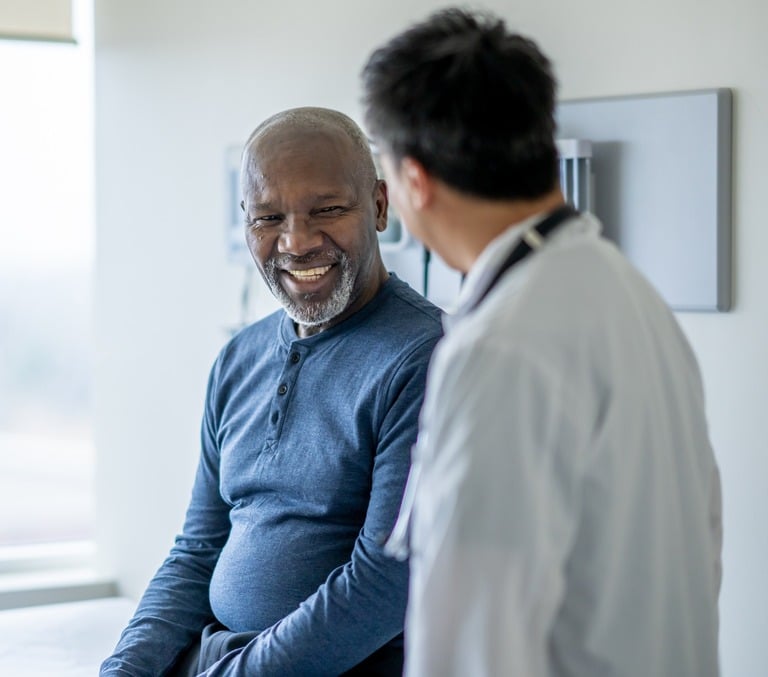Clinical trials help bring new treatments — and hope — to people everywhere. But that only works when the people in those trials reflect all of us. Diversity in clinical trials matters because it leads to safer, fairer, more trustworthy medicine.
At M3 Wake Research, we’re dedicated to making that real.
Diversity Means Better Science (and Better Health)
When study participants are mostly white or from a narrow demographic, the results aren’t always accurate for everyone. The New England Journal of Medicine put it plainly in their article “Why Diverse Clinical Trial Participation Matters”: diversity builds trust, supports fairness, and fuels solid biomedical knowledge.
A UK clinical review confirmed: diverse participation helps reduce bias and deepens understanding of how disease and treatments affect different groups.
Other leading publications like BMJ Medicine and ScienceDirect highlight how the lack of diversity undermines trial quality, generalizability, and validity.

Real Effects: How Diversity Impacts Treatment
Not every health condition affects every group in the same way—and that’s a major reason why diversity in trials matters.
For example:
- Heart disease tends to appear earlier and more aggressively in Black Americans.
- Lupus is more common—and often more severe—among women of color.
- Osteoporosis is often underdiagnosed in men because it’s historically viewed as a “women’s disease.”
If clinical trials don’t reflect these differences, the treatments developed might not work as well, or could even be harmful, for the people who need them most.
Diversity helps researchers spot these variations early. It makes clinical trials more accurate, more effective, and more likely to improve health outcomes across all communities.
Building Trust: Overcoming Historic Barriers
Unfortunately, research hasn’t always earned public trust. Historic abuses, like the Tuskegee study, created deep mistrust, especially among Black communities. Without diversity, certain groups miss out on medical benefits. The FDA and academic medical journals have repeatedly emphasized the drawbacks of narrow trials.
At a Washington Post Live event, experts underscored structural issues — time, cost, mistrust, health literacy — that block volunteer enrollment, and the need for real community partnership to change things.
Why It Matters in Real-Life Examples

Mammogram Study for Breast Cancer
A massive global trial comparing 2D vs. 3D mammography intentionally enrolled nearly 93,000 women, including high numbers of Black, Hispanic, and Asian participants. Why? Because Black women face 40% higher mortality from breast cancer, and older trials often failed to reflect those risks.
Other initiatives, including Harvard/WHAM’s push to include women and funding backed by RAND, show how research that includes women and ethnic minorities is both ethically and economically smart.
Barriers & How We Overcome Them
An analysis in Trials Journal outlines key challenges: “social determinants of health,” lack of trust in providers, socioeconomic constraints, and gaps in community outreach or poor tools to assess or improve engagement.
At Wake Research, we recognize these barriers and work to break them down:
- Community partnerships: We co-design outreach efforts with trusted local organizations.
- Cultural competence training: Our staff is trained to communicate respectfully and clearly.
- Flexible logistics: We offer appointments outside traditional hours and help with transportation.
- Transparent communication: We clearly explain how trials work, what to expect, and how participant data is protected.
These strategies match leading guidance from academic and regulatory groups working to modernize clinical research.
Why It’s Essential for Ethics & Regulation
Inclusive trials aren’t just good science: they’re an ethical responsibility. The Declaration of Helsinki emphasizes that research must serve all populations equally, and that participant rights come first.
Regulatory bodies agree:
- The NIH and FDA require trial sponsors to report demographic data and include underrepresented groups.
- Guidelines like CONSORT help ensure clinical results are transparent, inclusive, and applicable to real-world care.
How Wake Research Does It Differently
At M3 Wake Research, we believe inclusive trials aren’t just important — they’re necessary. Here’s how we lead the way:
- Patient‑centered recruitment: We connect with local communities, clinics, churches, and cultural groups to reach broader audiences.
- Inclusive study design: We ensure eligibility criteria don’t unintentionally exclude key populations.
- Diverse teams: Our coordinators and staff reflect the communities we serve.
- Real-world access: We reduce participation barriers through transportation support, flexible scheduling, and multi-language communication.
- Accountability: We monitor and report our enrollment data to ensure we reflect the real-world populations we aim to serve.
The Outcomes: More Equity, Better Care
When trials reflect the diversity of our communities:
- Medicine gets smarter: We detect differences in effectiveness and side effects sooner.
- People trust more: Community representation builds confidence in medical research.
- We all benefit: Treatments become safer, more effective, and more equitable for everyone.
The result? A stronger, more inclusive healthcare system — one that truly works for all.
Frequently Asked Questions
What does “diversity in trials” really mean?
It means including people from all racial, ethnic, gender, age, and socioeconomic backgrounds in medical research.
Why have so many groups been underrepresented in research?
Historical biases, rigid study designs, logistical barriers, and mistrust have all played a role.
Is it safe to join a clinical trial?
Yes. All trials are reviewed by independent ethics boards, and participants are fully informed before joining.
How is Wake Research different?
We focus on trust, community partnerships, and reducing participation barriers—ensuring more people feel welcomed and heard.
What happens if treatments aren’t tested in diverse groups?
They may not work as expected—or may cause side effects—in the populations that weren’t included.
How can I participate or learn more?
Visit our Find a Trial page or find a local clinic to find clinical studies or connect with our team about joining a trial near you.
Contribute to Diversity in Clinical Studies
Diversity in clinical trials isn’t a box to check — it’s the foundation of safe, effective medicine.
At M3 Wake Research, we believe everyone deserves to be represented in the science that shapes our care. We’re building a future where research reflects real life, and we’d love for you to be part of it.
Explore our available clinical trials or contact a local M3 Wake Research clinic in your area to see how you can contribute to the future of medical science.

